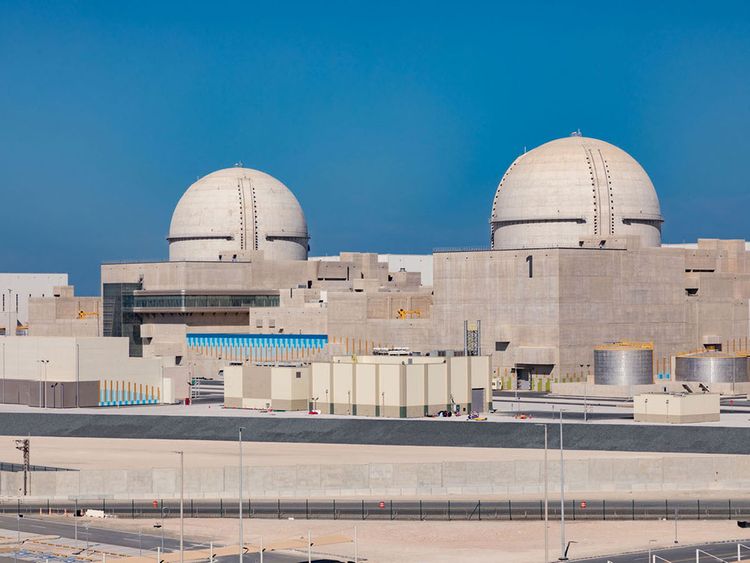The Unit 3 of the Barakah Nuclear Energy Plant, which is situated in the Al Dhafra Region in the emirate of Abu Dhabi, has successfully been launched, according to a press release from the Emirates Nuclear Energy Corporation (ENEC).
The milestone shows the considerable progress being made in bringing the four units of the Barakah Plant, the first multi-unit operational nuclear plant in the Arab World, online and accelerating the decarbonisation of the UAE’s power sector on the way to Net Zero by 2050. The start-up of Unit 3 has been achieved a year after the start-up of Unit 2, with the next key milestone being the connection of Unit 3 to the national electricity grid in the coming weeks.
This announcement comes at a time when many countries are looking to mitigate energy shortages because of the global energy crisis, emphasising that the UAE’s decision to add nuclear energy to its energy mix back in 2008 is now delivering results, providing a clean and reliable baseload source of electricity for the nation.
Unit 3, once commercially operational, will add another 1,400 megawatts of zero-carbon emission electricity capacity to the national grid, a major boost for UAE energy security, and a major step forward in tackling climate change. The clean electricity generated at Barakah is sustainably powering homes, business and high-tech industries across the UAE and the successful development of the plant demonstrates the country’s extensive megaproject management capabilities.
Mohamed Ibrahim Al Hammadi, Managing Director and Chief Executive Officer of ENEC, said, “We have reached another major milestone in the delivery of the UAE Peaceful Nuclear Energy Programme today, as we move forward with the provision of strategically significant clean energy for the UAE. The Barakah Plant is spearheading the decarbonization of the power sector, sustainably generating abundant electricity to meet growing demand and power growth. The UAE has developed a world-class nuclear programme that builds on experience and continuously shares its lessons with global industry peers, making the Barakah plant a case study for the world on a new nuclear project delivery”.
“Thanks to the data-driven decisions of the UAE’s wise leadership, Barakah is now spearheading domestic energy security and sustainability in parallel, at the time of a global energy crisis, highlighting the unique capabilities of nuclear energy in solving energy security and sustainability in parallel. The commissioning of the plant is just the beginning, with innovation and R&D now key in ensuring the realisation of the full scope of the programme,” Al Hammadi added.
Nawah, the Joint Venture nuclear operations and maintenance subsidiary of ENEC and the Korea Electric Power Corporation (KEPCO), have been safely progressing through a comprehensive testing programme, before successfully completing the start-up of the third nuclear energy reactor of the Barakah Plant. Testing has been undertaken under the continued oversight of the UAE’s independent nuclear regulator, the Federal Authority for Nuclear Regulation (FANR), and follows the World Association of Nuclear Operators’ (WANO) completion of a Pre-Start-Up Review (PSUR), prior to receipt of the Operating Licence, which ensures Unit 3 is aligned with international best practice in the nuclear energy industry.
Commenting on this milestone for the UAE, Ali Al Hammadi, Chief Executive Officer of Nawah, said, “We congratulate our teams, comprising highly skilled and qualified UAE nationals and international experts, for safely and efficiently starting up the third of our four units. Today is another momentous occasion for the Barakah Plant, and we are already increasing power in the reactor, generating more heat, and preparing for the delivery of the first megawatts of clean electricity to the grid, in accordance with national regulations and international standards. The start-up of Unit 3 is a clear demonstration that our Emirati talents, working closely with international experts and organisations, have developed the know-how and capability to operate three nuclear Units simultaneously safely and reliably. We look forward to the upcoming connection of Unit 3 to the national electricity grid as we work to deliver up to 25 percent of the UAE’s electricity demand.”
Start-up is the first time Unit 3 has produced heat through nuclear fission. The heat is used to create steam, turning a turbine to generate electricity. Making use of the experience gained in the start-up of Units 1 and 2, the qualified and licenced team of nuclear operators conducted numerous safety tests after safely loading fuel into the reactor earlier this year.
In the coming weeks, Unit 3 will be connected to the national electricity grid and the operations team will continue with the process of gradually raising power levels, known as Power Ascension Testing (PAT). The process will be continuously monitored and tested until maximum electricity production is reached, while adhering to all regulatory requirements and the highest international standards of safety, quality, and security.
Both Units 1 and 2 of the Barakah Plant are operating commercially, providing an abundant source of clean and reliable electricity 24/7, while Unit 4 is in the final stages of commissioning prior to completion of construction. ENEC is spearheading the decarbonisation of the power sector and the Barakah Plant is an essential component of the UAE’s Net Zero 2050 Strategy. The plant is a catalyst for innovation in the clean energy transition, including SMR development and next generation reactors, and a bridge to other clean fuels like hydrogen.
The facility creates high-value jobs and fosters the expansion of regional industries, serving as a catalyst for the development, energy security, and stability of the country. Through the quick decarbonization of the energy sector, barakah also significantly improves the nation’s ecology over the next 60 years and beyond. The project will stop 22.4 million tonnes of carbon emissions annually when it is fully operating, which are the main contributor to climate change.


